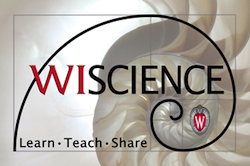WISCIENCE to expand possibilities for science education, outreach
The University of Wisconsin–Madison’s Institute for Biology Education is announcing its expansion to become the Wisconsin Institute for Science Education and Community Engagement, or WISCIENCE. The new mission extends across the natural sciences and expands responsibility for facilitating cross-campus collaboration and coordination in the areas of science outreach and support for groups underrepresented in science.

The creation of an institute for science education was part of Chancellor Rebecca Blank’s commitment to the White House’s initiative to increase college access for low-income students, particularly in science. WISCIENCE also responds to a 2013 task force on science, technology, engineering and mathematics (STEM) outreach and engagement that called for a centralized entity to promote collaboration and build overall capacity for science outreach.
“We’ve partnered beyond biology on higher education initiatives with faculty and staff and promoted cross-campus collaboration on science outreach for a long time, and the majority of our student programs focus on addressing the needs of underrepresented groups,” says WISCIENCE director Janet Branchaw, an assistant professor of kinesiology.
“We often contribute our expertise in science education to existing efforts, and we look forward to forming more partnerships that bring people together across programs and disciplines. Creating diverse communities catalyzes innovation and allows good ideas to have more impact.”
The institute’s work dates back to the creation of the Center for Biology Education in 1989 through a grant from the Howard Hughes Medical Institute (HHMI). In addition to collaborating on many external projects and programs, WISCIENCE provides discipline-based teaching and learning support for educators on campus; outreach and professional development to advance K-12 science education; and programs to engage students at all levels, particularly beyond the classroom.
.jpg)
Janet Branchaw
“Since we work on so many levels, one strategy we use is to integrate programs to create mutually beneficial outcomes for multiple groups,” says Branchaw.
For example, faculty and staff WISCIENCE Fellows mentor graduate students and postdoctoral scholars in the Teaching Fellows program as they create instructional materials for WISCIENCE’s first-year undergraduate seminars. Within the Adult Role Models in Science (ARMS) program, a service-learning course trains undergraduate and graduate students to work alongside after-school program teachers — also trained through ARMS — to implement more than 40 science clubs in low-income areas across Madison.
“We could have simply provided staffing to run the freshman seminar and science clubs,” says Branchaw, “but training future scientists to do this work amplifies our impact and prepares them to be leaders, partners and creators. It builds capacity.”
Branchaw’s own work focuses on undergraduate research experiences, providing training and tools for both mentors and mentees. Her Integrated Biological Sciences Summer Research Program (IBS-SRP), the largest summer research program on campus, has become a significant pipeline connecting low-income and underrepresented minority students to graduate training programs at UW–Madison.
“Creating diverse communities catalyzes innovation and allows good ideas to have more impact.”
Janet Branchaw
Her book, “Entering Research: A Facilitator’s Manual,” guides instructors through a mentee-training curriculum designed to help students overcome some of the challenges involved in research experiences at a large university. Branchaw has also been named the associate director of the Mentor Training Core of the National Institutes of Health National Research Mentoring Network (NRMN), created to enhance diversity in the biomedical industry workforce. Under Branchaw’s leadership, WISCIENCE staff will work to coordinate UW–Madison’s mentor and mentee training with the national network.
Other new WISCIENCE projects this year include the opening of the BioHouse residential learning community and the BioCommons, a community space for students in Steenbock Library.
— Amy Bethel
Tags: biosciences, diversity, learning, outreach, research




